
FOREVER SCHUMANN
Daniel Levy
Limited Edition – 18 outstanding Albums
We are proud to announce the release of a new set of recordings entitled FOREVER SCHUMANN by the renowned pianist Daniel Levy, dedicated to the composer Robert Schumann.
The recordings are a major new series that gather together 112 works, including pieces for piano, chamber music with piano, lieder and works for piano and orchestra of Robert Schumann, which Daniel Levy has devoted himself to studying throughout his life and career as a musician.
The first 9 albums of the Limited Edition are NOW AVAILABLE! (Digital & physical formats)
-
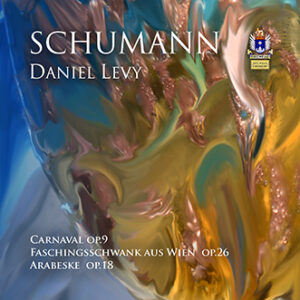
Schumann Carnaval
€17.00 – €26.00 Buy album This product has multiple variants. The options may be chosen on the product page -
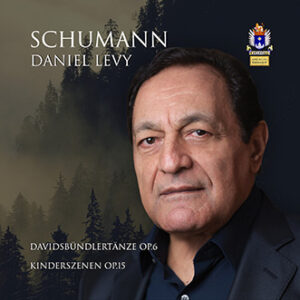
Schumann Davidsbündlertänze & Kinderszenen
€17.00 – €26.00 Buy album This product has multiple variants. The options may be chosen on the product page -

Schumann Album for the Young
€17.00 – €26.00 Buy album This product has multiple variants. The options may be chosen on the product page -

Schumann Piano Concerto
€17.00 – €26.00 Buy album This product has multiple variants. The options may be chosen on the product page -

Schumann Lieder
€17.00 – €26.00 Buy album This product has multiple variants. The options may be chosen on the product page -

Daniel Levy plays Schumann vol.2
€17.00 – €26.00 Buy album This product has multiple variants. The options may be chosen on the product page -

Daniel Levy plays Schumann vol.3
€17.00 – €26.00 Buy album This product has multiple variants. The options may be chosen on the product page -

Daniel Levy plays Schumann vol.7
€17.00 – €26.00 Buy album This product has multiple variants. The options may be chosen on the product page -

Schumann Chamber Music – Sonatas for Violin
€17.00 – €26.00 Buy album This product has multiple variants. The options may be chosen on the product page
LISTEN to samples of the first 9 albums:
The next 9 albums of the Limited Edition will be available from the 10th MAY 2025:
-
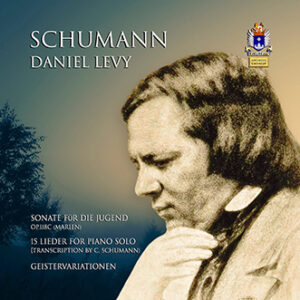
Schumann Sonate für die Jugend
€17.00 – €26.00 Buy album This product has multiple variants. The options may be chosen on the product page -
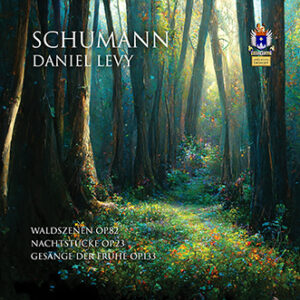
Schumann Waldszenen
€17.00 – €26.00 Buy album This product has multiple variants. The options may be chosen on the product page -
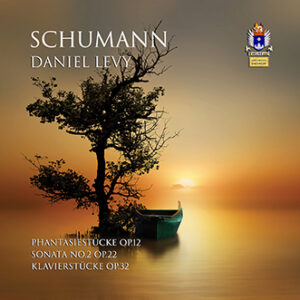
Schumann Phantasiestücke
€17.00 – €26.00 Buy album This product has multiple variants. The options may be chosen on the product page -

Daniel Levy plays Schumann vol.1
€17.00 – €26.00 Buy album This product has multiple variants. The options may be chosen on the product page -

Daniel Levy plays Clara & Robert Schumann vol.4
€17.00 – €26.00 Buy album This product has multiple variants. The options may be chosen on the product page -

Lieder: Cristina Mantese – soprano
€17.00 – €26.00 Buy album This product has multiple variants. The options may be chosen on the product page -

Daniel Levy plays Schumann vol.5
€17.00 – €26.00 Buy album This product has multiple variants. The options may be chosen on the product page -

Daniel Levy plays Clara & Robert Schumann & Brahms vol.6
€17.00 – €26.00 Buy album This product has multiple variants. The options may be chosen on the product page -

Schumann Chamber Music
€17.00 – €26.00 Buy album This product has multiple variants. The options may be chosen on the product page
Limited Edition – Works Included & Artists
DANIEL LEVY
With Dietrich Fischer-Dieskau (conducting and declamation)
Philharmonia Orchestra
Wolfgang Holzmair (baritone)
Nicolás Chumachenco (violin and viola)
Cristina Mantese (soprano)
Antony Morf (clarinet)
Zürich String Quartet
Pietro Borgonovo (oboe)
Marcello Rota (horn)
WORKS FOR PIANO SOLO
Papillons op.2
Impromptus über ein Thema von Clara Wieck op.5
Davidsbündlertänze op.6 (first and second edition)
Variations sur un Nocturne de Chopin
Allegro op.8
Carnaval op.9
Sonata n.1 op.11
Phantasiestücke op.12
Kinderszenen op.15
Kreisleriana op.16
Phantasie op.17
Arabeske op.18
Blumenstück op.19
Sonata n.2 op.22
Nachstücke op.23
Faschingsschwank aus Wien op.26
Drei Romanzen op.28
Scherzo, Gigue, Romanze und Fughette op.32
Studien für den Pedal Flügel op.56
Album für die Jugend op.68 – Unpublished pieces Album für die Jugend
Waldszenen op.82
Albumblätter op.124
Sonate für die Jugend op.118c
11 Lieder for piano solo (transcription Clara Schumann)
15 Lieder for piano solo (transcription Clara Schumann
Thema mit Variationen “Geistervariationen”
CLARA SCHUMANN
Variations on a Theme by Schumann op.20
JOHANNES BRAHMS
Variations on a theme by Schumann op.9
PIANO AND ORCHESTRA
Piano Concerto in A minor op.54
Konzertstück (Introduzione ed Allegro Appassionato) op.92
PHILARMONIA ORCHESTRA – conducted by DIETRICH FISCHER-DIESKAU
CHAMBER MUSIC
Violin Sonaten op.105 and op.121
NICOLÁS CHUMACHENCO – violin
Fantasiestücke op. 73 for clarinet and piano
ANTONY MORF – clarinet
Adagio and Allegro op.70 for horn and piano
MARCELLO ROTA – horn
Märchenbilder op.113 for viola and piano
NICOLÁS CHUMACHENCO – viola
Drei Romanzen op.94 for oboe and piano
PIETRO BORGONOVO – oboe
Marchenerzählungen op. 132 for clarinet, viola and piano
NICOLÁS CHUMACHENCO – viola
ANTONY MORF – clarinet
Piano Quintet op. 44
ZÜRICH STRING QUARTET
LIEDER AND DECLAMATION
Schön Hedwig op.106 (Friedrich Hebbel)
Zwei Balladen op.122 (Friedrich Hebbel and Percy B.Shelley)
DIETRICH FISCHER-DIESKAU – declamation
Lieder on Poems by Heinrich Heine
Liederkreis op.24
Lieder on Poems by Niolaus Lenau op.90
Lieder on Poems by Emanuel Geibel
Zigeunerliedchen
WOLFGANG HOLZMAIR – baritone
Liederkreis op. 39
Widmung op.25 F. Rückert
Du bist wie eine Blume op. 25 H.Heine
Die Lotusblume op.25 H.Heine
Du nußbaum op.25 J. Mosen
Clara Schumann Lieder
Warum wilst du and’re fragen op.12 n.11 F.Rückert
Liebst du um Schönheit op.12 n.14 F.Rückert
Am Strande – R. Burns / W.Gerhard
Johannes Bramhs Lieder
Von ewiger Liebe op.43 n.1 J. Wenzig
Die Mainacht op.43 n. 2 L.Holty
CRISTINA MANTESE – soprano
Bonus for download – Live concert
Meine Rose op.90 n.2 N.Lenau
Stille Tränen op.35 n.10 Kerner
Dichterliebe op.48 H.Heine
VICTOR TORRES – baritone
Schumann’s Music Today and Always

The pianist Daniel Levy has recorded the vast majority
of Robert Schumann’s piano works. Here he shares his thoughts about the composer:
What he declares is the pure truth: “In Music, the soul feels in its homeland”. That happens with his music, because what he transmitted to us is entirely what he lived. And that is how he moves us and will carry on moving us to the arcane core of our being. He teaches us to refine our feelings and is an educator in real emotions. In his dreams he makes us see another world, close to us, where Good and Harmony reign.
His rhythms and his harmonic complexities reflect the movements and pulsations of life, with dense and subtle chromaticism. They bring us closer to listening and seeing the light, without mediation or filters.
He is a lover of the ineffable and is able to narrate the unattainable to us. His aesthetic is that of a poet. And what is sublime is that the answers to our most intimate longings are already contained in his musical questions.
He transmits secrets to us through whispered harmonies suspended in time, which go directly to our hearts.
He is the master of fragments, of ‘stück’ (pieces), and within them he is able to reflect an interior landscape and natural perfumes, with the electricity of an instant.
In his Lieder he amazes everyone, bequeathing to our intuition that unanswered mystery – whether he put music to a poem or whether both were born at the same time.
The more we listen to and experience his works, the more our hearts pulsate to one of his melodies that is always born in the present, without traces of the past.
He knows the bridge that links music to the beyond and he brings it closer to us with his bravery. He makes it perceptible and then returns it to the invisible. There are no veils covering his intuition.
He has listened to angelical voices and he transcribed them to the stave. In the theme of the second movement of the Violin Concerto and in his final work, the variations on the theme that Schubert and Mendelssohn dictated to him, he placed us in front of the pioneer clairaudience of the musician.
This certainty of genius makes many smile skeptically, and that is how such sarcasm reveals severe ignorance, against which he battled – like David – all his life until the end, to remove Philistinism from human existence.
His greatest maturity was not only to have loved children and young people dearly, fully understanding their fantastic world, but also to have allowed his inner child to live within himself and to have expressed it in his music.
He is the most contemporary of musicians, because he lives in rhythm, he pulses outside of temporary limits and thus revolutionises consciences.
For all this and for much more, Robert Schumann’s music today.
Dietrich Fischer Dieskau
“I see it as wonderful luck to have encountered the artist Daniel Levy who incorporates for me dedication to his art and seriousness of approaching the great works of our beloved repertoire. His corresponding and flexible way of finding his very personal path to the heart of the works he is playing evokes admiration. I owe to him some important impulses.”
Dietrich Fischer-Dieskau
What the Critics Say
A vital addition to Schumann’s Discography.
Fanfare Magazine, USA
…But it is with a composer to whom he has devoted particular attention, Robert Schumann, that Levy seems to identify with especial conviction. If you listen to some of his most recent recordings, you will find Schumann’s personality and his compendious artistic range illuminated with fresh and perhaps unsurpassed vividness. We already know, from his most familiar works, what an intensely human composer Schumann is–at once mercurial and gemütlich, dreamy and epigrammatic. There is rhythmic fluidity in the writing, with its frequently offbeat accents, and a sometimes surprising richness of polyphony that contradicts the supposed verticality of the piano’s natural textures. Yet it’s not often that the musical character is realized with such force and clarity as, for instance, in Levy’s performance of the seventh movement of Kreisleriana, combining sheer rhythmic impetus with unshakable poise, and continuity of pulse with delicacy of paragraphing.
The pianist achieves light and shade even in this hell-for-leather piece; and that restrained ending, by the way, is the kind of thing that Levy turns to eloquent account in his playing of Schumann–the composer’s almost Ivesian way of closing a boisterous piece with a brief slower and lighter conclusion. There are other Schumannesque characteristics, too, that we may not previously have noticed, but that come to the fore in some of the less well-known works Levy has recorded. Listening to the eighth of the Albumblätter, or Album Leaves, Opus 124, I’m almost tempted–if this isn’t too much of an insult–to suggest that Schumann’s exploitation of unevenly truncated phrases and dissociative textures, searchingly rendered by Levy, points forward to some of Schoenberg’s piano music.
Bernard Jacobson
An all-time great recording…lovingly phrased and exultantly voiced.
Julian Haylock, BBC Music Magazine
This is one of the most ingratiating, thoughtful, and lyrical performances of the Schumann Piano Concerto that I have ever heard… Levy and his partner, legendary singer turned conductor Dietrich Fischer-Dieskau, find a quality of dramatic interplay that is quite magical. The Konzertstück, with its characteristically Schumannesque horn textures, is also delivered with a deeply satisfying sense of flesh and blood. The obscure Schön Hedwig and Zwei Balladen, written for solo piano and speaker, may not engender repeated hearings except for specialized tastes, but are rendered with a magnetic theatricality by Fischer-Dieskau.
Fanfare USA
An unusual and imaginative Schumann programme presented with imposing interpretative flair.
Ian Lace, MusicWeb International UK
The undertaking is obviously a labour of love. His emotional ardour is unmistakable.
Gramophone UK
Daniel Levy is a susceptible, most romantic pianist, able to convey Schumann’s innermost secrets with heart-easing warmth and affection.
Hi-Fi News & Record Reviews, UK
Daniel Levy is much more than a pianist who draws his strengths from mysterious sources. He seems to be truly committed to a profound transmission of the contents of the composition and the representation of the work itself.
Fonoforum, Germany







